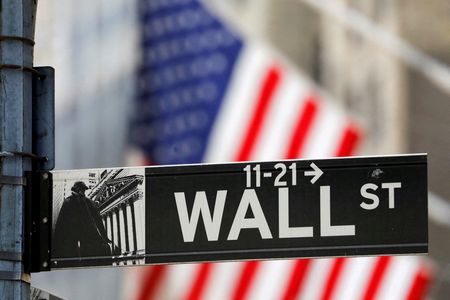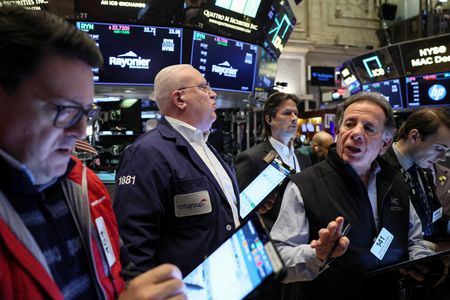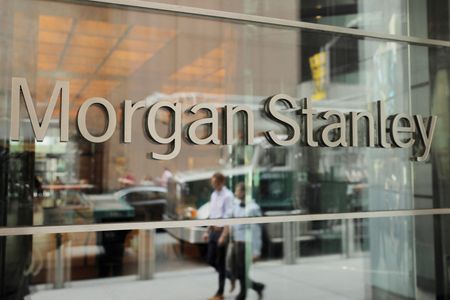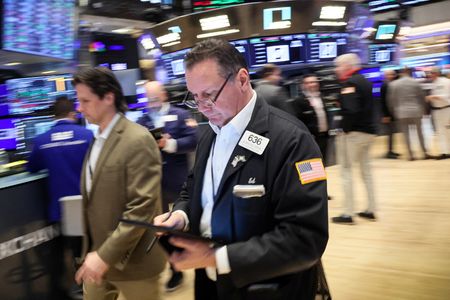By Chris Prentice and Nell Mackenzie
NEW YORK/LONDON (Reuters) -Shares on Wall Street and in Europe fell on Monday and government bond yields jumped as traders amended their expectations of a near-term U.S. interest rate cut.
Federal Reserve Chairman Jerome Powell continued to push back against the prospect of near-term rate cuts, in an interview aired on Sunday.
U.S. services sector growth picked up last month and employment rebounded, data showed on Monday. But suppliers appeared to fall behind, leaving a measure of input costs at an 11-month high.
“Markets could get squeamish as purchasing managers reported a big uptick in prices paid, mostly reflecting the increase in shipping costs. However, this uptick should be temporary,” said Jeffrey Roach, chief economist for LPL Financial in Charlotte, North Carolina.
The Dow Jones Industrial Average closed down 0.71%, at 38,380.12, as the S&P 500 lost 0.32% to 4,942.81 and the Nasdaq Composite fell 0.20% to 15,597.68.
MSCI’s broadest index of world shares fell 0.36%. The pan-European STOXX 600 index ended 0.1% lower.
Two-year Treasury yields jumped to a one-month high of 4.483% after Federal Reserve chair Jerome Powell said in an interview aired on Sunday that he wanted to wait to be a little more confident that inflation was sustainably falling before moving interest rates lower.
A higher number of companies’ fourth-quarter results missed analyst expectations than historically, said a Goldman Sachs research note on Monday.
Small-cap stocks in Asia slumped as investor sentiment remained at rock-bottom on a lack of policy support and broad stimulus for China.
The S&P China CSI 1000 small cap stock index fell more than 6%, closing at a three-year low.
China’s securities regulator vowed to prevent abnormal market fluctuations on Sunday, but announced no specific measures.
China’s blue-chip index closed up about 0.7% after dropping 2% earlier in the session and touching a five-year low last week. Hong Kong’s Hang Seng Index finished down about 0.2%.
State-backed investors – dubbed the “national team” – have stepped up buying blue-chip funds to support the market in recent weeks, but so far have failed to arrest a slump.
FED FOCUS
Global markets have been focused on the timing of the first Federal Reserve rate cut, after a strong slate of economic data along with resistance from central bankers led investors to scale back their rate-cut bets.
Markets are currently pricing in an 80% chance of the Fed standing pat on rates in March, compared with a 33% chance at the start of the year, the CME FedWatch tool showed.
Data on Friday showed U.S. job growth accelerated in January and wages increased by the most in nearly two years, signs of persistent strength in the labour market that encourage the Fed to start easing later rather than sooner.
“I think the Fed could be concerned with the link between sticky wages and future inflation prints,” said Ben Bennett, APAC investment strategist for Legal and General Investment Management.
In an interview with CBS News show “60 Minutes,” Powell said the Fed can be “prudent” in deciding when to cut rates.
The dollar index, which measures the U.S. currency against six other majors, was up after touching a twelve-week peak at 104.6 [FRX/]
Oil prices rose for the first time in four sessions amid concerns over escalating Middle East tensions after U.S. strikes on Iran-aligned factions in Iraq, Syria and Yemen.
Brent crude futures settled higher by 66 cents, or 0.9%, at $78.22 a barrel and U.S. crude settled at $72.78 a barrel, up 50 cents, or 0.7%.
Elsewhere in commodities, spot gold prices fell 0.7% and gold futures settled down 0.5% at $2,042.90.
(Reporting by Chris Prentice, Nell Mackenzie and Ankur Banerjee, additional reporting by Sudip Kar-Gupta; Editing by Ros Russell, Kirsten Donovan and Nick Zieminski and Aurora Ellis)






